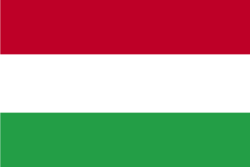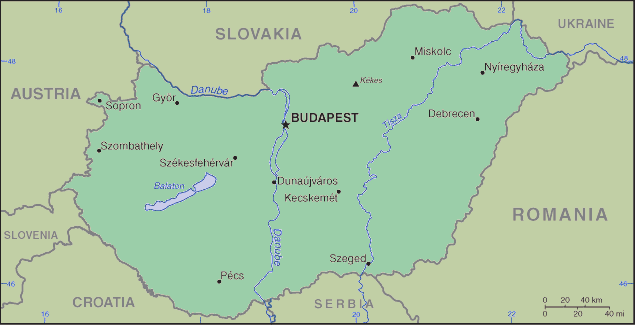Traveling Luck for Hungary. Hungary, Europe
Hungary is located in Central Europe, northwest of Romania.
Land in Hungary is mostly flat to rolling plains; hills and low mountains on the Slovakian border.
Hungarian land covers an area of 93030 square kilometers which is slightly smaller than Indiana
Hungary has borders with Austria for 366km, Croatia for 329km, Romania for 443km, Slovenia for 102km, Slovakia for 677km and Ukraine for 103km.
 Hungarian national flag (Flag of Hungary)
Hungarian national flag (Flag of Hungary)
As for the Hungarian climate; temperate; cold, cloudy, humid winters; warm summers.
Hungarian(s) speak Hungarian 93.6%, other or unspecified 6.4% (2001 census).
Places of note in Hungary
- Budapest
- Debrecen
- Miskolc
- Szeged
- Pécs
- Újtelep
- Nyíregyháza
- Székesfehérvár
- Szombathely
- Szolnok
- Tatabánya
- Kaposvár
- Békéscsaba
- Zalaegerszeg
- Veszprém
- Érd
- Eger
- Sopron
- Dunaújváros
- Nagykanizsa
- Hódmezővásárhely
- Salgótarján
- Cegléd
- Ózd
- Baja
- Szekszárd
- Vác
- Pápa
- Gyöngyös
- Kazincbarcika
- Gödöllő
- Gyula
- Hajdúböszörmény
- Kiskunfélegyháza
- Ajka
 Hungarian map
Hungarian map
Regions of Hungary
- Bács-Kiskun
- Baranya
- Békés
- Békéscsaba
- Borsod-Abaúj-Zemplén
- Budapest
- Csongrád
- Debrecen
- Dunaújváros
- Eger
- Fejér
- Győr
- Győr-Moson-Sopron
- Hajdú-Bihar
- Heves
- Hódmezővásárhely
- Hungary (general)
- Jász-Nagykun-Szolnok
- Kaposvár
- Kecskemét
- Komárom-Esztergom
- Miskolc
- Nagykanizsa
- Nógrád
- Nyíregyháza
- Pécs
- Pest
- Somogy
- Sopron
- Szabolcs-Szatmár-Bereg
- Szeged
- Székesfehérvár
- Szolnok
- Szombathely
- Tatabánya
- Tolna
- Vas
- Veszprém
- Veszprém
- Zala
- Zalaegerszeg
Hungary was part of the polyglot Austro-Hungarian Empire, which collapsed during World War I. The country fell under Communist rule following World War II. In 1956, a revolt and announced withdrawal from the Warsaw Pact were met with a massive military intervention by Moscow. Under the leadership of Janos KADAR in 1968, Hungary began liberalizing its economy, introducing so-called "Goulash Communism." Hungary held its first multiparty elections in 1990 and initiated a free market economy. It joined NATO in 1999 and the EU in 2004.
Hungary has made the transition from a centrally planned to a market economy, with a per capita income one-half that of the Big Four European nations. Hungary continues to demonstrate strong economic growth and acceded to the EU in May 2004. The private sector accounts for over 80% of GDP. Foreign ownership of and investment in Hungarian firms are widespread, with cumulative foreign direct investment totaling more than $60 billion since 1989. Hungarian sovereign debt was upgraded in 2000 and together with the Czech Republic holds the highest rating among the Central European transition economies; however, ratings agencies have expressed concerns over Hungary's unsustainable budget and current account deficits. Inflation has declined from 14% in 1998 to 3.7% in 2005. Unemployment has persisted around the 6% level, but Hungary's labor force participation rate of 57% is one of the lowest in the Organization for Economic Cooperation and Development (OECD). Germany is by far Hungary's largest economic partner. Policy challenges include cutting the public sector deficit to 3% of GDP by 2008, from about 6.5% in 2005, and orchestrating an orderly interest rate reduction without sparking capital outflows.
Hungarian natural resources include bauxite, coal, natural gas, fertile soils, arable land
landlocked; strategic location astride main land routes between Western Europe and Balkan Peninsula as well as between Ukraine and Mediterranean basin; the north-south flowing Duna (Danube) and Tisza Rivers divide the country into three large regions
Hungarian religion is Roman Catholic 51.9%, Calvinist 15.9%, Lutheran 3%, Greek Catholic 2.6%, other Christian 1%, other or unspecified 11.1%, unaffiliated 14.5% (2001 census).
Travel Advice for Hungary
HungarySUMMARY
- Hungary shares with the rest of Europe a threat from terrorism. Attacks could be indiscriminate and against civilian targets.
- Around 400,000 British nationals visit Hungary each year. Most visits are trouble free. The main type of incident for which British nationals require consular assistance in Hungary is petty crime, often including the loss of money and/or passports.
- Last autumn, there were a series of political demonstrations in Budapest and elsewhere in the country. Further demonstrations are likely on and immediately after 15 March. There have been some cases where generally peaceful demonstrations ended in violence as a result of the actions of a small minority of protesters. As a precaution you should avoid political demonstrations.
- In January 2007, Hungarian authorities confirmed the existence of the H5N1 (Avian Influenza) virus strain in five dead geese in south-east Hungary. No human deaths or infections have been reported. The Hungarian authorities have announced that strict biosecurity measures are being enforced in accordance with EU legislation. Please see Health section for further information.
- We strongly recommend you obtain comprehensive travel and medical insurance before travelling. You should check any exclusions, and that your policy covers you for the activities you want to undertake. Please see: Travel Insurance.
SAFETY AND SECURITY
If you travel by overnight train you should, if possible, travel accompanied and you should secure your compartment from the inside.
Political Situation
LOCAL LAWS AND CUSTOMS
ENTRY REQUIREMENTS
HEALTH
GENERAL

 Search
Search Hungary country profile
Hungary country profile Travel advice for Hungary
Travel advice for Hungary